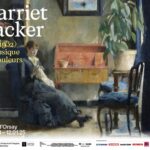A la demande d’un collègue de Rouen, voici des adresses pour étudier cette chanson et le mettre dans son contexte socio-historique. Ce travail entrera bien dans le cadre de « Black History Month », en Février chaque année.
Lyrics
http://www.lyricsfreak.com/b/billie-holiday/17859.html
Video clip
http://www.pbs.org/independentlens/strangefruit/film.html
To download and analyse the song from a musical point of view
http://odeo.com/audio/157180/view
History of the song and lyrics
http://en.wikipedia.org/wiki/Strange_Fruit (all the info)
http://www.spartacus.schoolnet.co.uk/USACstrangefruit.htm (short and simple, with several relevant links)
http://www.wsws.org/articles/2002/feb2002/frut-f08.shtml (more complex)
http://www.geocities.com/anthropologyresistance/fruit.html
http://www.canongate.net/News/BillieHoliday
http://www.metroactive.com/papers/cruz/04.20.05/holiday-0516.html ( in relation to Angela Davis’ book)
Billie Holiday’s bios (on K12 sites)
http://www.east-buc.k12.ia.us/98_99/Ess/tiffany.htm (by a student)
http://www.cdps.k12.ms.us/chs/teles032/second3.html ( id but longer, with pictures)
http://cms.westport.k12.ct.us/cmslmc/music/jazzbios/holliday.htm
Comments
in French and German : http://www.arte-tv.com/fr/art-musique/Billie_20Holiday/819254,CmC=832806.html
< http://www.jimcrowhistory.org/resources/lessonplans/hs_lp_billie_holiday.htm>Billie Holiday’s Strange Fruit: Using Music to Send a Message–Many early African-American songs, such as « The Drinking Gourd, » were used to pass secret messages during the period of slavery. As Reconstruction passed into the Jim Crow Era, predominately African-American music such as jazz and blues evolved. This music explored the feelings of frustration, poverty, and depression that many African-American communities experienced. This music also began advocating for social change. Songs that promoted social activism were rare before the mid 1960s. One of the earliest of these songs, « Strange Fruit, » was sung by the blues singer, Billie Holiday. Though it was popular, Holiday’s recording company, Columbia Records, refused to produce the song due to its controversial nature. A small record company picked it up, and it has now been commonly accepted as Holiday’s signature song. (from http://teachers.henrico.k12.va.us/Specialist/franceslively/sol8.htm )
Interpretation on a blog « Lady Sings The Dixiecrat Double Entendre Blues » (for teachers, go to dec 16th)
http://bodyandsoul.blogspot.com/2002_12_15_bodyandsoul_archive.html
Lesson Plans
http://www.teachervision.fen.com/page/4839.html?wtlAC=GSLessonplans,email-h (très complet)
http://www.wpe.com/~musici/strangedbq.html (constructed response activity)
http://www.pbs.org/teachersource/thismonth/sept03/index1.shtm ( descendre au n°7)
http://hs.riverdale.k12.or.us/~moldani/enghist11/strangefruit.html (in connection with the Jim Crow Laws)
« Jazz is about Freedom » http://www.pbs.org/jazz/classroom/jazzfreedom.htm
« Blues, art and poetry » : http://tvdec.k12.ne.us/cec/cecneemanwelniak.htm
« Lesson for The Florida Terror: Race Relations in the Early Twentieth-Century » http://www.pcsb.k12.fl.us/tah/d-3-2.htm
http://www.pcsb.k12.fl.us/tah/pdfs/d-3.pdf (same lesson in .pdf)
some questions from < http://seced.ucps.k12.nc.us/Curriculum Areas/English/English III/Strange Fruit.doc> http://seced.ucps.k12.nc.us/Curriculum Areas/English/English III/Strange Fruit.doc :
« This is Billie Holiday’s signature song. As you listen to it, keep the following questions in mind:
– How does Holiday use her voice to reinforce the tone of the poem?
– What is the subject of the poem? How does this relate to A Raisin in the Sun?
– Let us not forget about the works that we read in the past. Can you connect the poem to The Grapes of Wrath in any way? »
Poems, raps from students after studying Civil rights and black Americans (example of production)
http://www.okaloosa.k12.fl.us/djj/Technologykp/Blackhistoryweb/poemraps.html
Audio files
– in a program called « Here and Now » about Rosenbergs’ son, with transcript of the introduction, followed by an interview of Robert Meeropol about his parents, the Rosenbergs.
http://www.here-now.org/shows/2003/06/20030618_5.asp
– in a program called « The Connection » the song and an interview (no script)
http://www.theconnection.org/shows/2000/05/20000526_b_main.asp
– in a program called « inside out » from Boston NPR « Jews and Blues »
http://www.insideout.org/documentaries/jewsandblues/listen.asp











